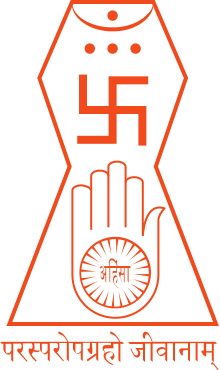Shrimad Rajchandra
| Rajchandra | |
|---|---|
 | |
| Religion | Jainism |
| Sect | Svetambara |
| Personal | |
| Born |
Raichandbhai Mehta 9 November 1867 Vavania Port, Gujarat |
| Died |
9 April 1901 (aged 33) Rajkot, Gujarat |
| Parents | Ravajibhai and Devabai |
| Religious career | |
| Website |
www |
| Part of a series on |
| Jainism |
|---|
 |
|
Jain prayers |
|
Ethics |
|
Major figures |
|
Major sects |
|
Festivals |
|
Pilgrimages |
|
|
Shrimad Rajchandra, born Raichandbhai Ravajibhai Mehta, was a prominent Jain poet, philosopher, and scholar. He is best known for his teachings on Jainism and as a spiritual guide of Mahatma Gandhi.[1][2][3]
Life
Shrimad Rajchandra was born on 9 November 1867, in Vavania Bandar near Morbi (now in Gujarat, India). His mother was Jain and his father was Vaishnava Hindu. He started speaking in public at age of 10 and writing articles at 11. He performed Shatavdhan (a difficult memory test of memorizing 100 different things at a time) at Sir Framji Cowasji Institute in Bombay in 1887. The same year, he married to Jhabakben and then engaged in the pearls and diamond business. At the age of 32, he contracted an illness from which he never recovered. He died on April 9, 1901 in Rajkot, Gujarat.[4][5]
Works
- Stri Niti Bodhaka
- Sad-bodh-shatak
- Mokshamala
- Bhavanabodh
- Atma Siddhi
He also translated several books and wrote some commentaries.
Poems
- "Apurva Avsar Evo Kyare Aavshe"
- "Mool Marg Sambhlo Jinno Re"
- "Bina Nayan Pavey Nahi"
- "Hey Prabhu! Hey Prabhu! Shu Kahu"
- "Yam Niyam Sanjam Aap Kiyo"
- "Ichche Chhe Je Jogijan"
"Apurva Avsar Evo Kyare Aavshe" and "Hey Prabhu! Hey Prabhu! Shu Kahu" were Mahatma Gandhi's favourite bhajans and were included in the Ashram Bhajanavali.[6]
Legacy
He summarized his interpretation of Jainism in Atma Siddhi, a Gujarati short verse poem written when he was 28 years old. In addition, throughout his life, he wrote 800 letters charting his spiritual journey. In his letters, he mentioned having the memory of several past lives at the age of seven, and in a letter written in 1890, he mentions having achieved self-realization.[5]
Shrimad Rajchandra Vihar, the Jain temple complex dedicated to him was erected on the eastern hillock of Idar hill in Gujarat.[3]
Relationship with Mahatma Gandhi
He is well known as a spiritual guide of Mahatma Gandhi. They were introduced in Mumbai in 1891 and had various conversations through letters while Gandhi was in South Africa. Gandhi noted his impression of Shrimad Rajchandra in his autobiography, The Story of My Experiments with Truth, calling Raichandbhai his "guide and helper" and his "refuge… in moments of spiritual crisis". He had advised Gandhi to be patient and to study Hinduism deeply.[1][2]
In 2016 independence day speech, Prime Minister of India Narendra Modi mentioned Shrimad Rajchandra's 150th birth anniversary and said,[7]
When Gandhiji was staying at South Africa, then also he was having correspondence with Shrimad Rajchandra Ji. In one of his letter Shrimad Rajchandra Ji discussed violence and non-violence. In that letter Rajchandra Ji writes, when violence came into existence from same time the principle of non-violence also born. The important thing in both is that which we prefer or which is being used in the interest of mankind.
In popular culture
A drama entitled Yugpurush: Mahatma na Mahatma depicting the spiritual relationship between Shrimad Rajchandra and Mahatma Gandhi premiered in November 2016.[8] The drama was produced by Shrimad Rajchandra Mission, Dharampur.[9]
References
- 1 2 Mahatma Gandhi (1957). An Autobiography: The Story of My Experiments with Truth. Beacon Press. ISBN 978-0-606-30496-2.
- 1 2 Thomas Weber (2 December 2004). Gandhi as Disciple and Mentor. Cambridge University Press. pp. 34–36. ISBN 978-1-139-45657-9.
- 1 2 Anjali H. Desai (2007). India Guide Gujarat. India Guide Publications. p. 188. ISBN 978-0-9789517-0-2.
- ↑ Shrimad Rajchandra: A Pictorial Biography. Mahavir Seva Trust. 1990.
- 1 2 Shrimad Rajchandra; Jagmandar Lal Jaini (rai bahadur) (1964). The Atma-Siddhi: (or the Self-Realization) of Shrimad Rajchandra. Shrimad Rajchandra Gyan Pracharak Trust.
- ↑ Gandhi, Mahatma. Swar-Lipi-Mein-Ashram-Bhajanavali. Navjivan. ISBN 817229266X.
- ↑ "Full text of PM Narendra Modi's 70th Independence Day speech". The Economic Times. Times News Network. Retrieved 17 November 2016.
- ↑ "Yugpurush". Yugpurush. Shrimad Rajchandra Mission Dharampur. Retrieved 16 November 2016.
- ↑ "Play looks at a scholar who shaped Mahatma Gandhi's spiritual journey". 16 November 2016. Retrieved 16 November 2016.
Further reading
| Wikisource has original text related to this article: |
| Wikisource has original text related to this article: |
- Atma-Siddhi : In Search of the Soul published by Vakils Feffer & Simons Pvt Ltd
- Life and Events
- Shrimad Rajchandra's Vachanamrut in Gujarati courtesy of and published by Agas Ashram
External links
- Shrimad Rajchandra Life History
- Shrimad Rajchandra Mission, Dharampur
- Shrimad Rajchandra Adhyatmik Sadhana Kendra, Koba
- Shree Raj Saubhag Ashram, Sayla
- Shrimad Rajchandra Aatma Tatva Research Centre, Parli
- Shrimad Rajchandra Ashram, Agas
- Shrimad Rajchandra life